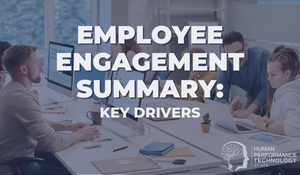Need Engagement Enlargement - Read the Core 4
With all the research and commentary on engagement, and how it is a somewhat soft driver of hard business metrics, it is important that we consider how to increase engagement among team members. Within our research, we have identified four fundamental pillars that underpin engagement strategies.
1. Face Brutal Reality
We have identified 3 brutal truths that we must face about engagement in order to understand how we can increase it. These are:
The First Brutal Truth - Most of the World’s Employees are NOT Engaged. DDI surveyed 50,000 employees and found only 19% are highly engaged. The Gallup Organisation run regular engagement surveys and in 2009 found that only about 20% of the Australian workforce are engaged, 60% are not engaged, and 20% are actively disengaged. Time and time again, the release of staggering statistics from at home and abroad tell us that we have a long way to go to increase workforce engagement.
The Second Brutal Truth - Engagement is Hard Work. Engagement is not a short-term initiative. It’s about culture. It takes time. Like trust, engagement is hard to build and easy to destroy. That means we have to be considering the impact of every decision, action and communication on engagement for individuals and teams.
The Third Brutal Truth - Engagement is Soft. Engagement is not a science. It's about people pledging their hearts. It’s about meaning, relationships, appreciation and trust. To be fully engaged by our work, we must have an emotional connection to it and its purpose. Engagement is as soft as it gets and if you have a problem with that, then you will be facing a big problem.
In order to start the journey to increasing engagement, we must face and accept these three brutal truths.
2. Understand
In order to increase engagement, it is important to take the time to understand it. It is important to understand what the research says, particularly in the last 10 years, then gauge how engaged your people and leaders are.
Understand the Research - If you want to increase engagement, you will first need to understand what engagement is and what it means. There are countless pages of research on engagement and more surfacing every day. As it is a relatively new concept, it is important to ask yourself: what can we learn from the research? What are the key drivers? What can we learn from other companies? What case studies are there? Will the same strategies work in our business? Are our competitors ahead or behind us?
Understand Your Situation – In order to increase engagement, we need to first understand our current situation. How engaged are our people? Do we have good measurement systems in place? Are the results good or bad for your industry? Find out what’s important – if people are disengaging, what’s the cause? What resources will we need? Who can help? Do we have experts, OD specialists? What obstacles are there?
Understand Engagement Starts at the Top – With their incredible influence on engagement, it is important to understand that successful and doomed engagement strategies are a result of the leaders. Some research has shown that more than half of CEOs are not engaged by engagement, a HR survey found: 22% do not understand the concept, 19.2% are not aware of the business benefits and 14.5% are aware of the concept, but do not believe there will be any ROI.
In order to increase engagement it is important to have a solid understanding of it to support your efforts.
3. Believe
Since engagement is what some might consider a “soft” business metric, it is important that the leaders in an organisation trying to increase engagement believe in it. If they do not, any initiative attempting to increase engagement will surely fail.
The leaders of an organisational must strongly believe in engagement as a way of life, so that it can be woven into the fabric of the culture. It’s not so much a strategy, a box ticking initiative, or a three month training program - it’s a worldview (a way of perceiving that effects every interaction you have).
We must believe in the in the value of engagement - it has shown significant ROI time and again, but it takes time to build. Evidence to support engagement is overwhelming: engagement is correlated to customer satisfaction, innovation, operational performance, productivity, profitability and retention. It may be soft, but its impact on an organisation can be measured.
Before embarking on any journey to try and increase engagement in a team, make sure you first invest the time into preparing the leaders and helping them see and believe in the power of engagement.
4. Commit
If you are looking to increase engagement in your organisation you must commit to it. In order to commit to engagement, there are several things you can do.
Hire People for Fit – One of the fundamental factors that leads to engagement is having the right people in the right seats. It is matching people to a job that suits the right mix of their skills, knowledge, attitude and behaviour. We all have our place in the world – in order to be engaged we just need to find how to productively apply our talents (and the help of those around us).
Look Beyond Extrinsic Rewards – The carrot and stick approach to motivation is out-dated and research shows that it can lead to decreased engagement. Intrinsic rewards are a powerful and renewable source of motivation and energy for people. With this type of motivation, people will find the emotional connection to their work that engagement promises.
Focus on Developing Strengths – People tend to be motivated and engaged by those tasks they have a natural flair for. By developing strengths, we are able to maximise what people do best while in turn rewarding them intrinsically.
Start with the Leaders – The leaders of an organisation are the linchpins when it comes to engagement. They have the ability to effect engagement both positively and negatively. In order to increase engagement in an organisation we must first work with its leaders to help them understand it and to drive it.
Communicate Often and Sincerely - Your not perfect, people know that. People’s BS meters are way too high these days to fake it. Today’s worker is far more intelligent and aware of what is happening in their organisation. Employees can't perform well or be productive if they don't trust the message your delivering. Be sure to communicate your expectations - be genuine - and do it often. If there are going to be problems, let them know. If times are hard, let them know. Make sure they understand the reasons for your decisions.
Pay Attention to KPI’s - Put a good person in a bad system and the system will win every time. Does the system reward or punish? How does it reward? Is everyone measured rewarded the same way? Remember people are different, enjoy different things and will be engaged by different things. It is your job to find out what and how to engage each individual.
Go Slow – As a famous shampoo advertisement once said “it wont happen over night, but it will happen”. It is important that you commit the time to developing engagement. Engagement is more than a destination, it is a never ending journey that we must all embark on. Take your time, learn and do it right.
These are a few ideas on where to start when trying to increase engagement. Remember, it is not something that you can put a Band-Aid over and hope for the best. If your organisation wants to be truly successful, developing a positively engaged workforce is a solid foundation on which to build.
Topics:
Employee Engagement
Theo Winter
Client Services Manager, Writer & Researcher. Theo is one of the youngest professionals in the world to earn an accreditation in TTI Success Insight's suite of psychometric assessments. For more than a decade, he worked with hundreds of HR, L&D and OD professionals and consultants to improve engagement, performance and emotional intelligence of leaders and their teams. He authored the book "40 Must-Know Business Models for People Leaders."



We Would Like to Hear From You (0 Comments)